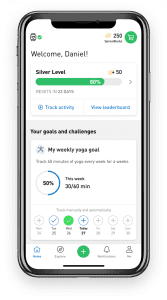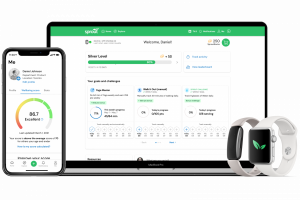Under normal circumstances, assuming the mantle of a CEO role would be an exciting opportunity. But doing so at the onset of a global pandemic would give pause to most people. Neer Sharma isn’t like most people, though. In March 2020, Sharma stepped into the role at Sprout Wellness Solutions (a healthtech platform that empowers organizations to embrace wellbeing) and hasn’t looked back. In fact, he’s seen it as an opportunity to innovate and grow the company.
Building on top of their existing product Sprout At Work (a full-service wellness platform designed to improve corporate and employee health by identifying and rewarding healthy behaviours), Sharma was instrumental in the launch of the Sprout Open Health API, a consumer-focused solution for global brands that captures health, behaviour, and lifestyle data in a safe and secure way.
Today, Sprout is on track for 86 percent Year-Over-Year growth with 15 million global customers. Under Sharma’s leadership, they’re working towards a healthier, more balanced future for work.


What is your defintion of wellbeing?
Wellbeing means many things but at its core it’s about making sure every employee is supported in living a healthy, happy life. As a healthtech company, this began for us well before the pandemic. For my team, wellbeing is supported and maintained in many different ways but wellbeing comes from trusting our employees and giving them the flexibility to maintain a healthy work-life balance. Whether that means going out for an afternoon walk to clear their head, or having the comfort in knowing that they have the flexibility to adjust their schedules to accommodate daycare dropoffs/pickups, I trust my team to make the decisions to move the company forward while managing their personal lives.
How has that definition changed since the start of the pandemic?
The definition really hasn’t changed for me during the pandemic, but what has changed is how that message has been amplified—and that starts with leadership. As a healthtech company, wellbeing has always been a top priority for us, but the pandemic brought new levels of stress and anxiety that our employees and our business had never experienced before. Our leadership team did an incredible job of stepping up, listening to and encouraging employees. We shouted from the rooftops that we could win this, we also talked about what we were doing personally to care for our wellbeing and we empowered our employees with the tools to connect with one another and care for themselves. Sprout has spent nearly a decade solving the wellbeing problem for businesses and we practice what we preach.
What is Sprout Wellness and why does it matter?
As a health technology company, Sprout Wellness Solutions helps organizations embrace wellbeing and improve the health and happiness of every user.
Sprout is available through our two product offerings, Sprout At Work and the Sprout Open Health API.
Sprout At Work is our full service corporate wellness platform designed to improve corporate culture and employee health by identifying, motivating and rewarding healthy behaviours. Sprout At Work gamifies wellness, provides engaging content and allows employees to reach their wellness goals at their own pace. Now, more than ever, Sprout At Work is essential to proactively take care of our health and wellness in response to the global pandemic and increased workplace burnout.
Sprout Open Health API is our consumer focused solution for global brands. We provide organizations with scientifically validated health and wellness features designed to safely and securely capture new health, behaviour and lifestyle. This data can then be utilized to deliver true value to customers through personalized customer experiences. Today, it’s essential to deliver the right product, to the right person at the right time and the Sprout Open Health API helps businesses to achieve this without the cost and complexity of building sophisticated platform features from scratch.
You became the CEO right at the start of the pandemic. What is the most valuable lesson you’ve learned so far?


In what ways did the pandemic provide an opportunity to innovate as a company?
By using this challenging time as an opportunity to focus on strategy, Sprout revamped its platform UI/UX, revised client processes, and expanded its product offerings into the PaaS space with our APIs. This has allowed us to connect to new and existing technology solutions. We have never been stronger as a company which is an amazing statement considering the impact this pandemic has had on businesses over the last year. By focusing on our employee app, and using the learnings we had from that to launch our industry-agnostic API, we are on track to grow 86 percent YoY. That is no small feat, and an accomplishment I am proud of which has been led by the team. This year has also been the most rewarding to me personally as I have seen our team step up and drive change at what most would define as the worst crisis impacting businesses in years.
What is the Sprout Open Health API?
Sprout Open Health API empowers businesses with advanced customer health data to improve customer loyalty, accelerate user engagement, and increase personalization. We’ve eliminated the cost and complexity of building and maintaining continuously evolving technology with an industry-agnostic solution that can either enhance an existing application or accelerate a new project.
How does the Sprout Open Health API address the unique needs of today’s leading businesses?
In 2021, brands and marketers need to think about customer experience beyond the transaction and look for ways to deliver real value. We need to know our customers better than ever in order to deliver the personalized experiences and offers consumers want.
The Sprout Open Health API, which launched this year, allows brands across any industry to quickly and easily add valuable new features to their new and existing apps in order to safely and securely collect new data sources. Our API solution captures real-time personal health, lifestyle and wellness data so that businesses can better understand their consumers in order to more accurately meet their needs, whether it is through delivering even more personalized content, relevant notification and nudges, or offering rewards to customers
Customer experience isn’t just a nice to have—it’s a must have in today’s digitally-driven economy.
Gallup’s 2021 State of the Workplace report indicated that US and Canadian workers experienced the highest daily levels of stress during the pandemic. How do you think companies can do a better job of supporting the wellbeing of their employees?
Employees have endured a work rollercoaster over the past 18 months. They are stressed and anxious, and these feelings won’t dissipate on their own, even as our world slowly reopens. 86 percent of high-potential employees are feeling burnt out and they are twice as likely to leave compared to their peers which is a scary thought for employers globally.
As a company, make it authentic and comfortable for employees to address their mental health concerns. This often starts with leadership demonstrating it themselves. Bring clarity and transparency to company goals and clearly map out how each individual and team responsibility ladders up. This process means that each of your employees knows what they are responsible for and feels connected and invested in the project.
With the addition of today’s new remote and hybrid working models, employers need to ensure they are serving their entire population and not simply checking the “wellness box”. This means delivering a holistic digital wellness solution that can be accessed from anywhere to provide every employee with the proper physical, nutritional, mental, and financial wellness offerings. You need to motivate and reward healthy behaviours, and empower your employees to embrace their own wellbeing and improve their overall happiness and health regardless of where they are in their journey.


What does the future of work look like from your perspective?
The future of work will be driven by tech innovation and the prioritization of flexibility and inclusion. That means finding ways for everyone to connect, be supported and perform their jobs regardless of whether they are in-office, on-site, hybrid or remote.
Clients are doubling down on their commitment to employee wellbeing. The corporate wellness market is projected to be worth $97.4 billion by 2027. With annual growth of five to 10 percent (McKinsey report). At the same time, as a society we are moving away from the “one-size-fits-all” approach. Digital wellness allows equitable access for all and the personalization we need.








